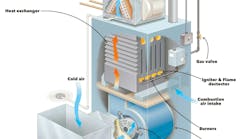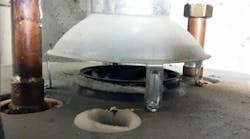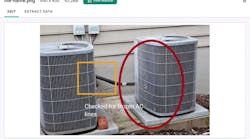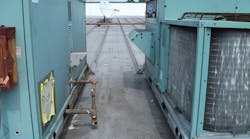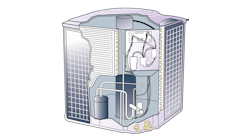By Dave Galbreath
As the days grow colder, now is the perfect time to test the low ambient controls on your commercial customers’ split air conditioning units.
The crankcase heaters, head pressure controls, and liquid line solenoid valves all need to be working properly in order to protect the equipment during low temperature operation. By low temperature I mean less than 50F.
Head pressure controls and solenoid valves (if present) are relatively simple to check, even in warmer weather. However, crankcase heaters are often overlooked on split condensing units.
Crankcase heaters might get checked in the spring, but as fall is for the heating start-up, little attention may be paid to the air conditioning condensers. Yet many commercial buildings require cooling all year long. Without the crankcase heater operating, refrigerant migrates to the coldest place, and mixes with the oil in the compressor. Every time the compressor starts, the liquid refrigerant and oil get pumped out into the system, beating up the valves in the compressor and running it low on oil.
What about scroll compressors? It’s true that they can pump liquid, and do it quite well. However, we find scroll units with broken hot gas lines, usually at or near the first elbow off the compressor. The copper hot gas line can’t take the hydraulic pressure generated by the compressor trying to squeeze liquid refrigerant and oil through a tube sized for vapor. Even if it doesn’t snap the line, there’s still the issue of loss of oil each time it starts.
Most of what we call commercial units (three-phase) don’t come standard with crankcase heaters anymore. If a unit you’re checking doesn’t have one, talk to your customer about why they need it. If your company installed the unit without it, put one in. It’s less expensive to install a crankcase heater then it is to replace a compressor under warranty.
Dave Galbreath is the service manager at Seaman's Heating/Air Conditioning/ Refrigeration in Grand Rapids, MI. He can be reached at 616/458-1544.
